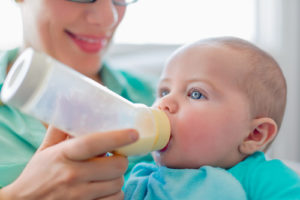 Good nutrition is essential to the rapid growth and development that occurs during a baby’s first year. What babies drink as well as what foods they eat, and when, are critical to providing growing babies with proper nutrients.
Good nutrition is essential to the rapid growth and development that occurs during a baby’s first year. What babies drink as well as what foods they eat, and when, are critical to providing growing babies with proper nutrients.
Here are some do’s and don’ts for new moms.
0 – 6 months
Until your baby is 12 months of age, most of his nutrition should be coming from breast milk or formula, with solid foods introduced around 6 months of age. If your baby drinks juice or water and less breast milk or formula during his first 6 months, he may not be getting enough important nutrients like protein, iron, and zinc.
As a newborn, babies get all the fluid they need from breast milk or formula. As you introduce solid food, their appetite for milk will start to reduce. You do not want the water to displace the intake of breast milk and/or formula.
6 – 12 months
Babies should continue to be fed breast milk or formula. It is not recommended you give your baby cow’s milk before turning one. Cow’s milk has enough protein and other nutrients to help baby cows grow, but it contains too much of these nutrients for human babies. It can hurt your baby’s intestines and kidneys.
After your baby’s first birthday, you can give whole cow’s milk to drink, and it is usually recommended you switch to low-fat milk when he turns two. It is important to use whole milk, because children under three years old need fat for brain development. (Small amounts of yogurt or cheese are fine before your baby turns one.)
After the age of one, you can introduce water (which is preferred) or diluted juice in a cup at mealtimes and throughout the day, but try to avoid fizzy drinks, hot drinks and drinks with artificial sweeteners.
The American Academy of Pediatrics’ policy statement recommends that babies younger than 6 months should not be given any juice, children aged 6 months to 6 years should get no more than 4-6 ounces per day, and children older than 7 should have no more than 8-12 ounces of juice daily.
Should I be using a bottle or cup?
If you are going to introduce water or juice, it is recommended you do so in a cup. Babies are often ready for a sippy cup (or regular cup) earlier than parents think! Babies as young as 4 months old can hold a small plastic cup and drink small amounts of fluid from it.
During the first year, babies’ mouths develop from being able only to suck and swallow to being able to chew. Introducing a cup by your baby’s first birthday will help him develop the skill of learning how to drink from something other than a bottle or breast, and eliminate the chance of a breast fed baby developing nipple confusion.
As your baby grows, how you feed your baby should also change as he grows. It is NOT recommended to put your baby to bed with a bottle, even if it has breast milk or formula in it. As your baby starts to fall asleep, the liquid can pool in his mouth and encourage bacteria to grow, which can cause cavities in newly-forming teeth.
